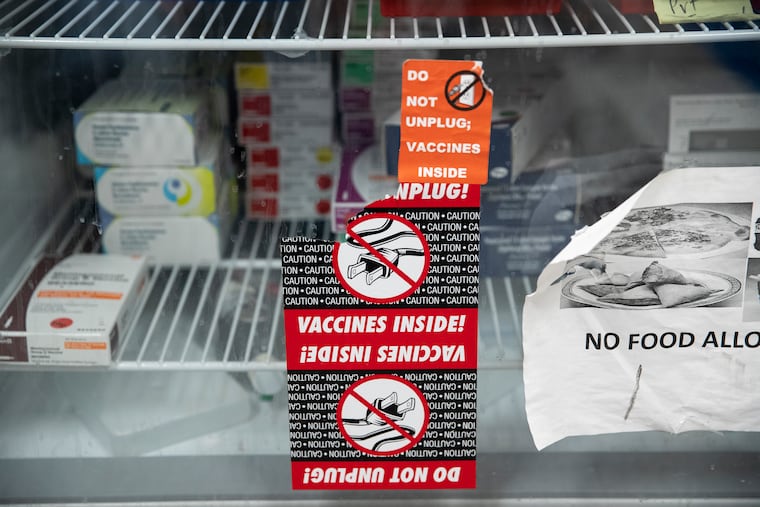Widespread budget cuts at the CDC are affecting Philly. Health officials worry about future reductions.
The city expects to be able to cover the gap in funding from the Centers for Disease Control and Prevention through other sources.

When parents bring their children to get vaccinated at Ala Stanford’s health clinic in Swampoodle, it’s crucial for the pediatric surgeon to know which shots they’ve already received.
She relies in part on databases like PhilaVax, a federally funded system that helps local physicians track their patients’ vaccine records and recommend which shots they should get next.
“You can’t just give a child a vaccine not knowing what they’ve had before,” said Stanford, a former director of regional operations for the U.S. Department of Health and Human Services.
But this month, the Centers for Disease Control and Prevention informed the city that the program will lose its more than $670,000 in federal funding — part of widespread budget tightening linked to a deal in Congress to extend the debt ceiling.
Philadelphia will cover the cuts using unspent money from federal COVID-19 relief funds, city Health Commissioner Cheryl Bettigole said. The cuts represent nearly 20% of the city’s $3.9 million in funding from the CDC to run the citywide vaccination program that includes the tracking.
Bettigole and other health officials around the country say they’re concerned that the cuts could be a precursor to broader reductions in public health spending.
“This is part of a rapidly unfolding disaster for public health,” Bettigole said in an email, calling the funding cuts nationally “a warning to us all that the wall of immunity that protects us all against vaccine-preventable diseases and other public health threats is at risk.”
Tracking vaccinations more effectively
Health departments around the country were notified earlier this month to expect cuts in the federal funding that many rely on to pay for vaccine programs, sexually transmitted infection prevention, and other public health services.
In Philadelphia, the cuts affect PhilaVax, an “immunization information system” that allows health providers to easily track vaccines their patients have already received, Bettigole said.
It’s a program used by many clinics such as the one Stanford runs in Swampoodle, the Dr. Ala Stanford Center for Health Equity, which aims to provide comprehensive primary care in a neighborhood where health-care options are scarce.
She said that some parents come into her office with their child’s vaccine records on hand, but others aren’t able to access online records, or don’t have a phone with enough data to load them.
Sometimes, the clinic has to get releases to dig through old medical records or call a child’s previous doctors. PhilaVax makes that task easier by consolidating vaccine records in one place, she said.
Like several other big cities, Philadelphia’s federally funded vaccine program is separate from the state’s. That’s in part to ensure that the city can more quickly respond to outbreaks of disease, without having to wait for funding appropriated from the state.
But the state is also facing cuts from the CDC.
Mark O’Neill, spokesperson for the state health department, said in a statement that $4 million in federal funding that had been set to go toward modernizing the state’s data tracking on immunizations was cut. He said the state is planning to move ahead with its efforts.
‘Come get your vaccines’
Stanford urged parents to continue to use the city’s existing services to vaccinate children.
“Come get your vaccines,” she said.
The city said in a 2021 report that routine vaccinations for adults and children dropped during the early part of the pandemic, with 60% fewer Philadelphians getting vaccinated in the spring of 2020, but later ticked back up.
About 70% of children in the city are eligible for free vaccines through the city’s federally funded Vaccines for Children program.
The health department was admonished by the city controller’s office earlier this year for skipping required site visits for the Vaccines for Children program during the pandemic. Health officials said that the staffers responsible for that had been swamped with other pandemic-related duties, and that the department is now conducting site visits as it did before the pandemic.
Elsewhere in the country, CNN has reported, local health departments are facing cuts to funding that paid for STI prevention, including disease intervention specialists who helped patients recently diagnosed with illnesses like syphilis to navigate care and treatment.
That’s concerning to public health officials like Bettigole and practicing physicians like Stanford, who say early intervention is key to preventing the spread of disease.
With cuts to those programs, Stanford said, “it’s harder to capture individuals that are impacted. And then we’re playing catch-up.”